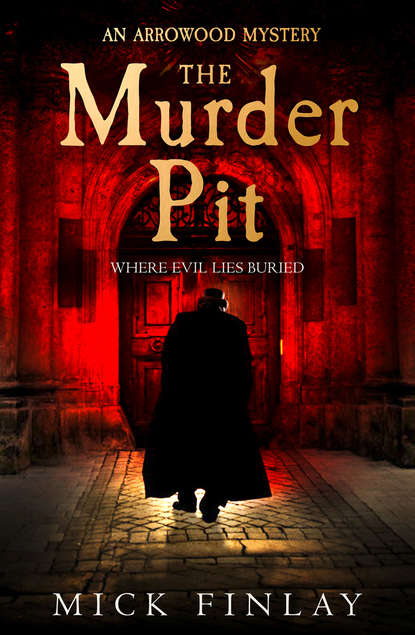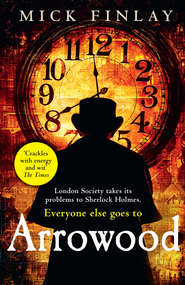По всем вопросам обращайтесь на: info@litportal.ru
(©) 2003-2025.
✖
The Murder Pit
Автор
Год написания книги
2019
Настройки чтения
Размер шрифта
Высота строк
Поля
‘If you want,’ I said, my voice hollow.
She heard my tone and her face fell.
‘I didn’t mean—’
‘I’m happy to do it, Ettie.’
I looked away. Whenever I started to feel easy, one of them’d remind me how they really saw me. I was his rough. What else could I be with these worn-out boots, this voice thick with the Bermondsey slums? Though I only lived in that foul court for six years, it seemed I’d never escape it.
‘Norman, I’m sorry,’ she said, her face as serious as I’d ever seen it. ‘I shouldn’t have asked.’
‘It’s fine,’ I said. ‘Really.’
She looked at me for a while, not knowing how to fix it, then went off to make some tea. The guvnor rested his head on the antimacassar and shut his eyes, working at healing himself.
Soon Ettie came back with the tray. I took a biscuit: the guvnor took four.
‘She’s asking for our help,’ he said when he’d refreshed himself. His face was sombre. ‘I’m sure of it. It kept me awake last night, seeing her up there, that picture, wondering what it means.’
‘But she didn’t actually speak?’ asked Ettie.
‘No, but I felt her sadness so clearly. Her fear. Norman felt the same when he saw her on the train. Sometimes all we have to work with are our feelings.’
‘Our feelings can lead us in the wrong direction, William, as well you know.’
‘Remember that book I was reading on crowd behaviour?’ He peered down at the pile of books by his chair and pulled out a green volume to show us. ‘Le Bon writes that emotions are contagious. I can’t say I properly understand how it works, and I’m not sure he does either, but there’s no doubt that emotions can be transmitted from one heart to another if we attend with care. Music can do it, can’t it?’
‘I suppose,’ said Ettie slowly.
A screaming started up in the road just outside the house, a child. The guvnor flinched, clutching his head. Then a woman’s scolding voice, then a man’s gruff roar joined in. They fought on and on as Lewis’s three clocks, each out of time with the others, ticked on the mantel.
‘We need to get to her, damn it!’ he cried suddenly, his fist banging down on the side table. ‘She couldn’t be more vulnerable! And that scar on her head might just be the start of a terrible journey. We have to think of something, Norman.’
‘Why don’t I go up there and try?’ asked Ettie. ‘They might react differently to a woman.’
‘No, Sister.’
‘But why not? The Ockwells aren’t going to let you in, that much is clear. The Barclays have tried the police and they won’t help. You’ve no other way to get to her.’
‘This is our work, Ettie. Walter has a history of violence. I don’t want you up there on your own. Anyway, why would you have more success than us?’
‘Women can sometimes do things that men cannot,’ she said, her chest rising in indignation. ‘What other choice have you, William? She’s asking for help. You said it yourself.’
He gazed vacantly at his sister across the room, pondering. His stomach groaned like a lonely cow. Finally he turned to me.
‘Remember those two labourers we saw the other day in the farmyard? The ones chased by the dog? Let’s see if we can find them in the fields. They might be able to tell us something. But first run down to the shop and get us a kidney pudding, will you, Barnett? And a dozen oysters.’
Chapter Nine (#ulink_b60aaab8-24f6-51cb-9606-320a600956b0)
We happened to find a butcher’s cart on its way to the Ockwell farm as we set out from the station that afternoon. He dropped us in the dip before the lane rose to the farm entrance, out of sight of the house, and there we pushed through a hedgerow. The field to our right was full of pigs, their heads bent, guzzling a scatter of turnips on the ground. The ground was frozen hard.
We followed a path between a small woodland and a paddock, where a couple of sulky horses stood, their bodies wrapped in coal sacks. They glanced at us with a hungry look in their eyes but didn’t come over. That suited me fine: I never believed a horse was a man’s friend like some folk said. A London horse is a slave, that’s what I always thought, and if you looked deep enough into their eyes you could see how they’d like nothing more than to give you a good kick up the arse.
Now we could see the barns up the hill. We moved on to the fields on the other side, making a wide circuit around the edge of the farm. There was nobody about. A dozen scrawny cows; some winter cabbages; another pig field of hard mud and low huts. The guvnor was limping, puffing, sneezing, unhappy with so much walking. After another ten minutes we found ourselves on a small path through a copse, a field on one side, a stream on the other. The water was black and half-frozen over, the trees above bare but for a handful of rooks crying out. Soon we could see the lane ahead.
‘Damn these shoes,’ complained the guvnor, wheezing proper now. His boots had got burned in the fire at his rooms, and, being a bit tight with his money over certain things, he’d been loaning a pair of Lewis’s shoes that didn’t fit him too good. ‘I was hoping Ettie would get me a pair for Christmas. She gave me another bible.’
I broke a couple of pieces of toffee from the slab in my pocket and handed him one. His scarf was wrapped around his chin, his bowler pulled so low all I could see were his puffy eyes and running nose. For a few minutes we worked on the toffees.
‘Monogrammed,’ he said at last. ‘Just like the last one.’
‘Is Petleigh still visiting her?’ I asked.
‘He came before New Year with a plum cake. I’ve never met anyone who plays cards so badly. He’s even worse than you.’
Isaiah Petleigh was an inspector with Southwark Police. He’d helped us with a few cases over the years and caused us problems on a few others. A few months back the inspector had taken an interest in Ettie and started calling upon her.
‘What does she think of him?’
‘I don’t know, Barnett. Ettie’s Ettie. She gets on.’
‘You lost, masters?’ came a voice.
It was an old woman, sat on a fallen tree behind a big mound of ivy. Her hands were wrapped in rags, and layers of old skirts covered her legs. She wore a most fantastical coat, like a stuffed blanket, red and gold and purple and tied round the middle with a rope.
‘Don’t get many gents walking through, is all,’ she croaked, her eyes shining bright from her sooty face. Further back in the copse, next to a narrow track, was a wooden caravan, its doors open, black pots hanging from roof hooks and a tin chimney poking out the top. A nag in a ragged coat stood chewing a pile of straw. ‘You the new land agent?’
‘No, madam. I’m Mr Arrowood. This is Mr Barnett.’
‘Mrs Gillie,’ said the crone.
‘D’you know the people who own the farm over there, Mrs Gillie? The Ockwells?’
‘Been stopping here all my life, sir. Knew old Mr and Mrs Ockwell since way back. He’d be turning in his grave if he saw the place now. She can’t be too happy neither, in her bed knowing all what’s going on. Richest farm round here, it was. Place’s a ruin these days. Fields ain’t draining proper; fences held together with string. Them pigs ain’t happy neither.’
‘How d’you know the pigs aren’t happy?’ asked the guvnor.
‘Spend too long lying down. A happy pig snorts merry, like. A merry snort. Like you, I shouldn’t wonder, like you when you’ve had a skinful.’
‘I never snort, madam.’
The old tinker laughed, showing us the most awful mouth I’d ever seen. There was only one tooth you could see in there, growing up from the bottom and separating halfway up, where the two parts twisted, one behind the other, like two burnt black twigs.
‘D’you see much of the family, mum?’ I asked her.
‘Don’t have nothing to do with them, not since the old master died.’ She nodded back towards the village and sighed. ‘My Mr Gillie was beaten on the road over there a few year back. Old Mr and Mrs Ockwell took him into their house. Poor old bugger didn’t last the week.’
‘I’m very sorry to hear it,’ said the guvnor.
Другие электронные книги автора Mick Finlay
Arrowood




 0
0






